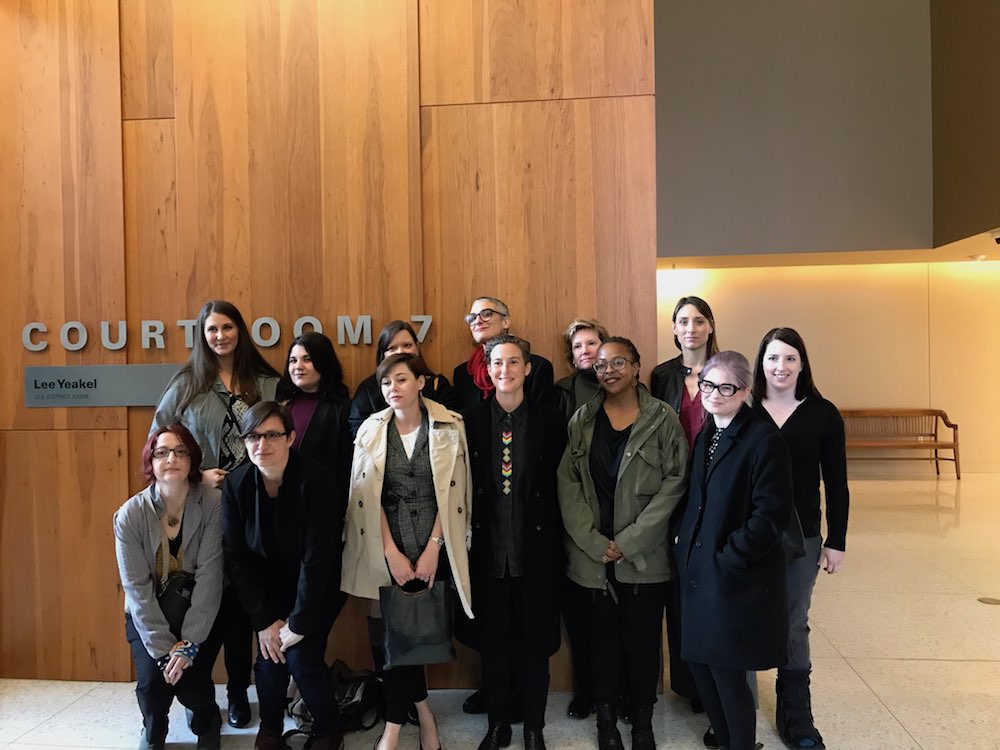Federal Judge Hears Oral Arguments in Sexual Assault Class Action
Yeakel to consider motions to dismiss before issuing scheduling order
By Sarah Marloff, 3:50PM, Mon. Dec. 17, 2018
U.S. Judge Lee Yeakel will not make a decision until after the holidays regarding the City of Austin’s and Travis County’s motions to dismiss the sexual assault class action suit brought against both entities by eight local rape survivors.

Yeakel spent the morning of Monday, Dec. 17, hearing oral arguments from counsel for the defendants – Travis County, District Attorney Margaret Moore, and her predecessor Rosemary Lehmberg (represented by assistant county attorney Tony Nelson); and the City of Austin, Police Chief Brian Manley, and his predecessor Art Acevedo (represented by Sara Schaefer of the City’s law department). Both the county and city have filed motions to dismiss the lawsuit. Meanwhile, attorney Jennifer Ecklund, representing the eight plaintiffs, argued to move forward toward discovery and eventually a trial. Several of the plaintiffs were present, and dozens of advocates for survivors quietly filled the courtroom to provide support.
The oral arguments expanded on claims previously made in filings on both sides. The County and the D.A.’s office continue to assert that the plaintiffs have not met the burden of proof to hold the D.A. responsible for the allegations in the lawsuit, which claims that systemic failures within law enforcement have led to discrimination and mistreatment of women rape survivors in Travis County. Nelson opened by noting that the D.A.’s motion to dismiss was not intended to suggest that the plaintiffs were not victims, but that the criminal justice system and courthouse doesn’t always provide closure when faced with proving guilt beyond a reasonable doubt. While the suit highlights statements made by Moore regarding sexual assault survivors, Nelson argued against the lawsuit’s use of “public comment[s]” from the D.A. “taken out of context.” Travis County continues to insist the suit lacks specific factual allegations and instead relies on statistics to make its case. Nelson, pointing to the 2017 stats – of approximately 1,000 sexual assault allegations made locally, only one made it to prosecution and that victim was male – argued those stats aren’t “controlled” or representative. This year, he added, 10 rape cases have been tried by the D.A.’s office and seven resulted in convictions. (During the plaintiffs’ rebuttal, Ecklund noted that 10 out of 1,000 cases is “still pretty stark” in terms of justice for survivors.)
Meanwhile, the City and APD argued against the suit’s allegations that they violated survivors’ Fourth and Fifth Amendment rights by not testing their forensic exam kits for years and not using them to “pursue additional investigation or process cases through the criminal justice system.” Schaefer argued that these protections could not be applied to plaintiffs who consented to the exams; that consent, she said, can’t be taken back because the evidence “wasn’t used the way they’d like.” Ecklund responded that plaintiffs were misled about how the kits would be used, and argued that if victims knew these kits would be left untested for years or not used to make an arrest, most survivors wouldn’t consent to the exam in the first place. Schaefer also contended that the suit doesn’t adequately establish gender discrimination, asserting that APD’s limited resources are not in themselves discriminatory, that sexual assault can’t be compared to other crimes such as homicide, and that offensive conduct by some officers, as alleged in the suit, is best understood as “stray remarks,” not policy.
During her 20 minutes of arguments, Ecklund said the class action is meant to address victims’ rights, adding that the details suggest these eight survivors are not alone in feeling discriminated against and silenced by local law enforcement and prosecutors, or in feeling that the city and county are taking “no action” to get rapists off the street. Further, she argued, the plaintiffs’ claims are not “vague” and “inconclusive”; when paired with the statistics cited, each one – from APD’s “unfunctional” DNA lab and infamous rape kit backlog, to the D.A.’s requirement that serious physical harm be present to move forward with a case, to the continued failure to arrest perpetrators and prosecute rape cases – should be enough to move forward with the suit. The plaintiffs, argued Ecklund, are entitled to discovery.
Yeakel applauded both sides for “wonderful arguments” but made note that as a federal judge, he’s faced with a very full docket. “I understand that everyone wants things to happen really quickly in this case and I recognize its importance,” he said. But Yeakel will not render a scheduling order for discovery until after he’s gone through the motions to dismiss, and certainly not before January 1, 2019.
Got something to say on the subject? Send a letter to the editor.
A note to readers: Bold and uncensored, The Austin Chronicle has been Austin’s independent news source for over 40 years, expressing the community’s political and environmental concerns and supporting its active cultural scene. Now more than ever, we need your support to continue supplying Austin with independent, free press. If real news is important to you, please consider making a donation of $5, $10 or whatever you can afford, to help keep our journalism on stands.
March 8, 2024
sexual assault federal class action suit, Margaret Moore, Brian Manley, Jennifer Ecklund, Sexual Assault, Lee Yeakel, APD Forensics Lab, Rape Kit Backlog








